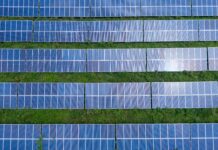by Doug Young
Bottom line: Yingli is in increasing danger of defaulting on its heavy debt load, which could result in a rapid and disorderly bankruptcy if its hometown government fails to provide support.
After sending out a steady series of distress signals over the last few weeks, solar panel maker Yingli Green Energy (NYSE: YGE) has sent out its strongest trouble sign yet as it struggles under a huge debt load. The most recent signal comes in a new filing with the US securities regulator, in which Yingli says its big debt could threaten its ability to survive, potentially making it the latest casualty in a clean-up of China’s bloated solar panel sector. Such an outcome would see Yingli follow in the footsteps of former high-flyers Suntech and LDK, and would raise the question of whether others may soon follow down a similar path.
First Suntech and LDK, and now Yingli have all struggled to service billions of dollars in bonds and bank loans they used to build plants for solar panel manufacturing at the height of an industry boom 7 years ago. Suntech’s inability to pay off a maturing bond was the trigger that finally forced it into bankruptcy 2 years ago, though it was already in deep financial trouble by then. Now the same thing could soon happen to Yingli, whose prospects are being clouded by recent weakness in the global solar panel market.
In its new filing with the US securities regulator, Yingli says it has nearly 15 billion yuan in debt ($2.4 billion), more than two-thirds of which is short term borrowings. (company announcement; English article) It said it is having difficulty servicing that debt, which could affect its competitiveness, its ability to get new financing and ultimately its ability to stay in business.
The announcement sparked a sell-off for Yingli shares, which tumbled 12.3 percent to $1.49 in the latest regular trading session in New York. The shares were down another 25 percent at $1.11 in after-hours trade, putting them in position to reach an all-time low if the declines hold in the next regular trading session. Shares of many other solar panel makers also dropped by smaller amounts, with Canadian Solar (Nasdaq: CSIQ) and ReneSola (NYSE: SOL) both down by more than 4 percent.
Yingli has yet to announce its first-quarter results, but reported net losses of nearly $90 and $210 million for last year’s fourth quarter and the full-year 2014, respectively. Its new announcement was its loudest signal yet that it may be the next to fail, following a recent string of similar signs.
YIngli was recently forced to sell some of its idle land in its hometown of Baoding to meet a debt payment due earlier this month, barely managing to avoid a default. (previous post) Another solar manufacturer named Tianwei, which also happens to be based in Yingli’s hometown of Baoding, last month made headlines when it became the first company to default on a domestic Chinese bond. (previous post)
It’s unclear if these 2 companies are related beyond the fact that both are based in the industrial northern city of Baoding. But what does seem clear is that the city of Baoding isn’t in any rush to bail out these local companies, which certainly isn’t a good sign for either. In the earlier Suntech bankruptcy, the company’s hometown of Wuxi was much more proactive in the bankruptcy process, even though Suntech’s management team was ultimately forced out.
In this latest case it’s probably still too early to say if Yingli will ultimately be forced into a similar bankruptcy, though the likelihood certainly looks high. The earlier bankruptcies 2 years ago were relatively orderly, thanks to strong support from local governments.
But now many of those governments are coming under economic distress as they struggle with their own big debt amid a slowing Chinese economy. Accordingly, first Tianwei and now Yingli probably can’t expect too much assistance from the local Baoding government, meaning a rapid fall and disorderly bankruptcy could come if and when the company fails to service its next upcoming debt obligation.
Doug Young has lived and worked in China for 15 years, much of that as a journalist for Reuters writing about Chinese companies. He currently lives in Shanghai where he teaches financial journalism at Fudan University. He writes daily on his blog, Young´s China Business Blog, commenting on the latest developments at Chinese companies listed in the US, China and Hong Kong. He is also author of a new book about the media in China, The Party Line: How The Media Dictates Public Opinion in Modern China.






